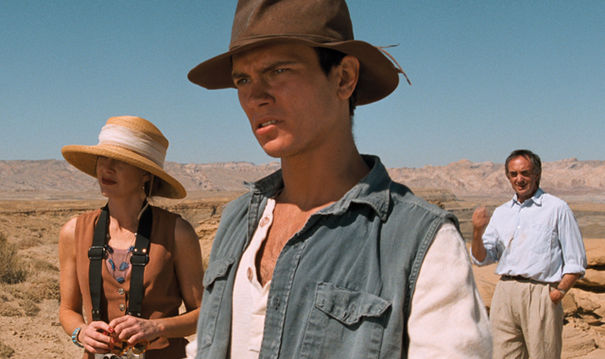Emperor. Spirit. Boy.
Aderinsola Ajao of the 2013 Talent Press Durban reviews George Sluizer's finally released fragment DARK BLOOD, starring River Phoenix in his last role.

Judy Davis, River Phoenix and Jonathan Pryce in George Sluizer's DARK BLOOD
Twenty years after the death of his lead actor, River Phoenix, Dutch filmmaker George Sluizer managed to finish his movie Dark Blood, if only with voice overs and script readings during the missing scenes.
Known for his high-strung intensity that saw his fast rise as an actor, Phoenix’s performance is as striking and captivating in STAND BY ME (1986);INDIANA JONES AND THE LAST CRUSADE (1989); and MY OWN PRIVATE IDAHO (1991).
Phoenix seems to feel comfortable as the melancholy, depressed widower Boy, who waits for the world to end after losing his wife to cancer caused by exposure to a nuclear-testing site. Meanwhile Harry (Jonathan Pryce) and Buffy (Judy Davis) are on their second honeymoon when their car breaks down in the middle of the American desert. Buffy's decision to seek help leads them to Boy's dilapidated house bringing an unexpected dark twist to the planned honeymoon. The usually unruffled Pryce is roughed up as Harry, Buffy's jealous and selfish husband, who now has to share his wife's attentions with a younger man.
In their first encounter Boy tells Buffy that he is 1/8 Hopi Indian, hence he has dark blood flowing through his veins. His granddad is also prone to melancholia, a trait Boy believes he has inherited. Later on, he introduces Buffy to his army of dolls and declares her the bride with whom he will claim his empire on earth and in the afterlife. His afterworld is housed in a ramshackle wooden structure – an odd piece of architecture with protrusions in every direction reflecting Boy's state of mind; the used spare parts ominously dangling from his front door accompanied by what Boy calls "Death's music." Alone with the mad, obsessed, rifle-wielding widower, the couple tries to escape but never manages to flee Boy and his dog. The animal, by the way, stays loyal to the end.
Like another icon, James Dean, Phoenix died in the prime of his life and as Boy in DARK BLOOD, his role echoes Dean's Jet Rink with a similar self-destructive obsession with another man's woman in the 1956 movie GIANT. Sluizer’s film also reminds us of VACANCY, a 2007 thriller by Nimron Antal starring Kate Beckinsale and Luke Wilson, who are stuck in a hotel managed by a psychopath bent on killing the couple. While one can assume that both films draw inspiration from Alfred Hitchcock’s PSYCHO, the new films, including DARK BLOOD, are not nearly as effective. Thankfully, Sluizer's film is not as explicit or cruel as THE HUMAN CENTIPEDE (2010), HOUSE OF WAX (2005) or the FINAL DESTINATION series, and probably never intended to be.
Sluizer's devotion to finishing DARK BLOOD is inspiring, but its effectiveness does not lie in the story, which is not particularly original. It is also debatable whether or not this would have been a better film had it been completed in 1993 under different circumstances. There is a sense that it tells little of Boy’s background and why he is the way he is, apart from the inherited melancholia and the loss of his wife. Scripted further into the film are nuances around such austerity: of love, and, perhaps, of emotion. Apart from the desert location, the anonymity of names like Buffy, Harry, Boy and Dog, are symbolic of the seclusion and deviance that DARK BLOOD epitomises.
Adopting still photography and voice-over narrative to cover parts of the film that could not be completed because of Phoenix's untimely death also adds an uncomfortable edge to the updated material. Twenty years later, excellent acting and Sluizer's moody, effective cinematography make the film worth watching. Loneliness, lunacy, love and loss are keenly explored. While there might not be enough thematic focus besides the eccentricity of seeing River Phoenix's final performance, perhaps there is a warning in DARK BLOOD about seeking help in the prairies when your car breaks down.

